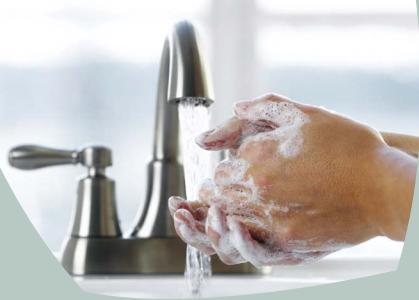Infections occur most frequently in hospitals and other health care settings like clinics and doctor’s offices where people have weakened immune systems.
No matter if you work in a healthcare support role such as medical billing and coding, are involved in direct patient care such as a medical assistant or indirectly such as a surgical technician it is utmost importance that infection prevention is at the fore of all of your daily duties and tasks.
This post forms part of our guide on the relationship between healthcare providers and patients. The purpose of this guide is to assist you in providing the best care with the deepest understanding and empathy for a patients concerns and worries.
This guide first appeared on Partnership for Healthcare.

Fortunately, there are simple things you can do at home, at the gym, and in the hospital, that can help prevent infection – including H1N1 and the seasonal flu.
At Home
- Wash your hands regularly. Make sure you always wash after going to the bathroom, before you eat, or after taking out the trash. Since it’s hard to always get to a sink, keep an alcohol-based hand sanitizer in your car or bag.
- Cover your mouth and nose if you cough or sneeze. Use a tissue or even the bend in your elbow to prevent spreading germs to others. Make sure to wash your hands afterwards.
- Take care of cuts, scratches and wounds. Keep all cuts, scratches and wounds clean and protected with a clean, dry bandage. Don’t “let it breathe” unless your doctor directs you differently. If cuts are not healing, see a doctor.
- Get all recommended vaccines. Ask at your doctor’s office or clinic if you should get vaccinated.
- Use prescription antibiotics responsibly. The flu, including H1N1, is viral so it can’t be treated with antibiotics. However, bacterial infections – like strep or pneumonia – can be treated with antibiotics. If you start taking antibiotics, be sure to take the full prescription. Stopping in the middle may allow the infection to return even stronger.
In the Community
- When you are sick, stay home from work or school, avoid public transportation and other places where there are crowds. Don’t shake hands or touch others.
- Practice good hygiene at the gym. Make sure to always clean weights, exercise mats and aerobic equipment with antibacterial wipes before and after you use them. Wear flip flops in the shower and steam room to prevent athlete’s foot or other infections. Shower after you work out and make sure you always use a clean towel to dry yourself.
- Keep exercise equipment clean. If you or someone in your family plays ice hockey, football or some other sport that requires personal protective equipment, be sure they wipe down this equipment with antibacterial wipes after every use. It’s important not to share personal equipment.
In the Hospital
- All health care workers should wash their hands before and after touching you. In many hospitals, doctors, nurses and other health care workers are encouraging patients to ask them directly if they’ve washed their hands.
- Remind your visitors to wash their hands. When someone comes to visit you in the hospital, be sure that they wash their hands before and after their visit.
- Talk to your doctor before having surgery. When you have surgery, your risk of getting an infection is higher. Before you have surgery, ask your doctor what you can do to protect yourself from infection. Ask if you should take antibiotics before or after your surgery.
- Ask about catheters. A catheter is a small tube that can be used to deliver fluids, medication or nutrition to your body. It can also be used to drain fluids like urine from your bladder. If your doctor or nurse says you need one, ask them what you can do to keep it from getting infected. Check it often, and if it becomes uncomfortable, or if the bandage becomes wet or dirty, tell a health care worker immediately.

